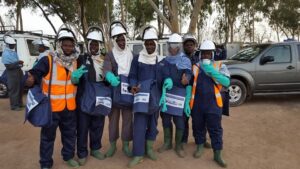
IRS is helping to reduce the burden of malaria in Benin. The PMI AIRS Project is working to ensure the gains made in malaria control continue even after IRS is withdrawn from targeted areas.
PMI AIRS Strategizes to Maintain Gains in Malaria Control
The U.S. President’s Malaria Initiative (PMI) has conducted indoor residual spraying (IRS) in Benin since 2008, resulting in significant reductions in malaria transmission in those areas sprayed. According to Benin’s Entomological Research Center of Cotonou (CREC), the entomological inoculation rate, which is a measure of malaria transmission, has reduced ten-fold in intervention areas, contributing to the reduction of the overall malaria incidence. IRS kills malaria-carrying mosquitoes by spraying insecticide on the walls, ceilings and other indoor surfaces where mosquitoes rest.
In 2017, after six years of spraying in seven districts in northern Benin’s Atacora Department, the Government of Benin’s National Malaria Control Program (NMCP) decided to move spray operations from Atacora to three districts of Donga Department and three districts of Alibori Department to address the high incidence of malaria in these areas. Thanks to a copayment from UNITAID’s NgenIRS project, which is being implemented through the Innovative Vector Control Consortium in collaboration with the PMI Africa Indoor Residual Spraying (AIRS) Project and other partners, two districts in Atacora will continue to be sprayed to help maintain the gains made in reducing malaria.
To avoid a resurgence of malaria in the areas no longer being sprayed, the PMI AIRS Project analyzed Atacora’s malaria burden and its health system, and proposed a strategy, which provides a framework for guidance and coordination among malaria control stakeholders. The strategy includes social and behavior communication; entomological and epidemiological surveillance; increased availability of malaria drugs, commodities and long-lasting insecticide-treated nets; monitoring risk factors for malaria increase; strengthening of the health information system; and capacity building for malaria case management.
Currently, Benin’s Medical Care Development International, with funding from the United States Agency for International Development, is producing an epidemiological newsletter to inform stakeholders weekly on the number of malaria cases and the availability of drugs and commodities for malaria control in the seven districts where IRS was withdrawn. To monitor malaria transmission, CREC conducts entomological surveillance in eight sentinel sites, three of which are in the former IRS area. The PMI AIRS Project provided CREC with automatic thermos-hygrometers for the monitoring of meteorological parameters affecting malaria transmission in the former and new IRS areas and supports CREC in the maintenance of this equipment and the collection of meteorological data. In October 2017, a workshop on social and behavioral communication and Benin’s 2017-2021 operational plan for malaria control was held with the PMI AIRS Project and other NMCP partners.
Through this multi-faceted strategy, the PMI AIRS Project is helping the Government of Benin to maintain its gains in malaria control and invest in new areas to further protect the population from this deadly disease.
This story was taken from www.africairs.net.
